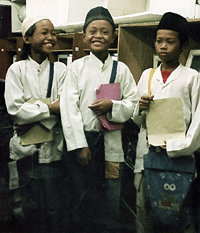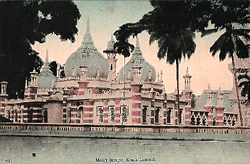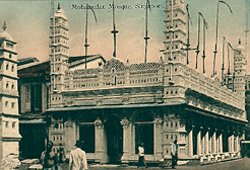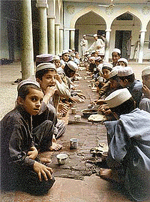The Islamic instruction of Malaysian and Indonesian students in India and Pakistan and the application of their knowledge in their home country
 |
|
|
Students
at an Indonesian Madrasah collecting donation at an internet cafe in
Jarkata.
|
The Indian ocean has been the oldest trade route and means of communication between the Indian subcontinent and the Malay archipelago for centuries. It was through the Indian ocean that Indian cultural, economic and political influence was brought to Southeast Asia, which led to what has been described as the first wave of 'Indianisation' that swept across the archipelago and extended up to Southern Vietnam. As Islam began to take root in the Indian subcontinent, so was it brought to the Malay archipelago by scores of Indian-Muslim Sufi (mystics), Ulema (scholars) and traders. The form and content of normative Islam in countries like Malaysia and Indonesia still carry a strong Indian flavour to it, and Indian Muslim scholars such as the famous alim Sheikh Nuruddin al-Raniri (from Ranir) contributed significantly to the development of early Malay-Muslim scholarship during the 17th century.
In the centuries that followed Indian Muslims played a crucial role in the development of both religious and political consciousness in Malaysia and Indonesia. The Indian and Pakistani nationalist movement inspired similar trends in Southeast Asia, and Indian Muslim leaders and thinkers like Mohd Ali Jinnah and Muhammad Iqbal were deeply respected by their Malay and Indonesian counterparts. Till today the major cities of Malaysia, Indonesia and the other countries of Southeast Asia are home to numerous mosques, schools, commercial centres and shrines built by the Indian Muslims who have been coming to the region since the 15th century.
 |
|
The
famous Jami' mosque of Kuala Lumpur, build by the British colonial government
in 'neo-moghul' style. |
The aim of the project is to study the process of education and the formation of transnational educational networks between Islamic educational establishments in Malaysia and Indonesia and their counterparts in India and Pakistan. The focus will be on the process of transcultural transfer of Islamic education. Refuting the claim that cultures are monolithic and self-contained entities, the project advances the thesis that processes of cultural exchange cannot be understood unless seen through the prism of transculturalism. Research will concentrate on the dynamics of cultural exchange and the roles played by the actors of social change.
One of the major theoretical concerns that needs to be addressed is how and why the increasing interconnectedness of educational networks has given rise to such a variation of, and at times even contradiction and competition between, different schools of Islamic thought. Other lines of inquiry concern the variable factors (socio-cultural, historical, political) that help to shape and define the content of Islamic education as it is transmitted via these networks.
 |
|
|
Mosque
built by Indian Muslims in Singapore during the British colonial period,
in distinctive Indian Style.
|
It will be interesting to find out whether the process of educational exchange among the various Islamic educational centres in Southeast and South Asia contributes to creating a "middle space" or "contact point", where new, hybrid, unconventional and innovative understandings and Asian interpretations of Islam emerge. This raises the question of whether the "contact point" effectively dislocates settled understandings of Islam in their respective societies. Linked to this is the issue of how the entry of Malaysian/Indonesian students into the subcontinent's madrasa network has altered the form and content of Islamic education there and whether or not it has in any way advanced the much quoted "radicalisation" of Islamist groupings and activists in Southeast Asia.
 |
|
|
Religious
students in a pakistani Madrassa
|
On the Malaysian and Indonesian side, investigation will centre on the educational activities of the Pan-Malaysian Islamic Party (Parti Islam Se-Malaysia, PAS), the Malaysian Islamic Youth Movement (Angkatan Belia Islam Malaysia, ABIM), the Malaysian Islamic Reform Movement (Jama'ah Islah Malaysia, JIM), the neo-Sufi Darul Arqam movement, the Nahdatul Ulama (NU) and the Muhamadijah.
On the South Asian side, research will primarily cover the Islamist movements and parties that are known to have connections and working relationships with their counterparts in Southeast Asia. Chief among them are the Jama'at-i Islami based in Pakistan and India, the various Deobandi-inspired Islamist movements and parties such as the Jam'iyatu'l-'Ulama-e Islam in Pakistan and other Jama'at and Deoband-derived movements in India and Pakistan. The research will focus mainly on educational institutions and the formal and informal educational linkages with Islamist movements and parties. This could range from the rudimentary pondok/pesantren (traditional schools) in the countryside to modernist educational institutions.